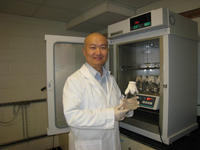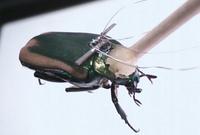-
Most affordable online degrees in homeland security
According to a recent study, at $7,300 Fort Hays State University is the best place to earn your online Master’s degree in criminal justice if you are looking for a bargain; last week GetEducated.com, a publisher of online college rankings and reviews, released its rankings for the most affordable online degrees in homeland security, forensics, criminal justice, and security
-
-
Community colleges invest in homeland security education
Since 9/11 community colleges have played an increased role in providing job training to those seeking careers in homeland security, intelligence, and disaster response
-
-
Pace University launches new cybersecurity institute
Last week Pace University announced that it had launched a special institution aimed at helping the United States alleviate the critical shortage of cybersecurity professionals and secure the nation’s data networks
-
-
Senate stalls on easing visa restrictions for highly skilled immigrants
A bill meant to allow more high-skill immigrants from India and China to obtain green cards has been placed on hold by Senator Charles Grassley (R-Iowa) over concerns that it should do more to “protect Americans at home”
-
-
Also noted
G4S Secure Solutions wins award for homeland security training and education | Cumberland and Salem Community College team to offer homeland security degree | University of Maryland promotes cybersecurity education | Government struggles with cybersecurity workforce | Cybersecurity: a varied field
-
-
Sector Report for Tuesday, 6 December 2011: Education Special
This report contains the following stories.
Plus 6 additional stories
-
-
Cyber-attackers think as regular crooks
An engineer and a criminologist are applying criminological concepts and research methods in the study of cybercrime; their work has produced recommendations for IT managers to use in the prevention of cyber attacks on their networks
-
-
Chicago emergency officials preparing for harsh winter

As Chicago braces for an especially brutal winter, the Cook County Department of Homeland Security and Emergency Management is doing its best to prepare residents, emergency responders, and work crews for the worst weather in the nation
-
-
Persistent undersea surveillance by autonomous robots

The U.S. military plans to deploy squadrons of air, surface, and undersea robotic vehicles later this decade, and wants to make these vehicles more autonomous; researchers develop an algorithm that helps sea gliders decide when to spend more time looking at regions that have changes in activity or environmental factors; without the control algorithm, gliders paid equal attention to all areas and acquired less information
-
-
Portable wastewater system generates energy, produces drinking water

Researchers are working to develop a portable wastewater treatment system that could improve the military’s efficiency; the solar-bio-nano project also will generate energy and produce drinking water, thus providing a potential blueprint for the future of municipal/agricultural wastewater treatment systems
-
-
Chinese rare earth embargo would be “disastrous,” says mining executive
Mike Parnell, the CEO of U.S. Rare Earths, Inc., recently took the time to chat with Homeland Security NewsWire’s executive editor Eugene K. Chow; in the interview Parnell discusses the potential consequences of a full Chinese rare earth metal embargo, efforts to develop alternatives to rare earth metals, and the progress made in making the drilling process more environmentally friendly
-
-
Soft robots wiggle and worm in tight spaces

Researchers have demonstrated a unique class of locomotive robot: a soft robot, composed exclusively of soft materials, which is inspired by animals (for example, squid, starfish, worms) that do not have hard internal skeletons
-
-
Large-scale power storage for the energy grid

The sun does not always shine and the wind does not always blow; Stanford University researchers have used nanoparticles of a copper compound to develop a high-power battery electrode that is inexpensive to make, efficient and durable that it could be used to build batteries big enough for economical large-scale energy storage on the electrical grid
-
-
Insects to become first responders, aid in search and rescue

Researchers are finding ways to harvest energy from insects, holding the promise of using insects to aid in first response and search and rescue, and monitor hazardous situations before sending in humans
-
-
Harvard-designed swarm robots licensed to Swiss company

Harvard researchers developed Kilobot — a low-cost, easy-to-use robotic system for advancing development of “swarms” of robots; robot swarms might one day tunnel through rubble to find survivors, monitor the environment and remove contaminants, and self-assemble to form support structures in collapsed buildings
-
More headlines
The long view
A Shining Star in a Contentious Legacy: Could Marty Makary Be the Saving Grace of a Divisive Presidency?
While much of the Trump administration has sparked controversy, the FDA’s consumer-first reforms may be remembered as its brightest legacy. From AI-driven drug reviews to bans on artificial dyes, the FDA’s agenda resonates with the public in ways few Trump-era policies have.
Risk Assessment with Machine Learning
Researchers utilize geological survey data and machine learning algorithms for accurately predicting liquefaction risk in earthquake-prone areas.
Foundation for U.S. Breakthroughs Feels Shakier to Researchers
With each dollar of its grants, the National Institutes of Health —the world’s largest funder of biomedical research —generates, on average, $2.56 worth of economic activity across all 50 states. NIH grants also support more than 400,000 U.S. jobs, and have been a central force in establishing the country’s dominance in medical research. Waves of funding cuts and grant terminations under the second Trump administration are a threat to the U.S. status as driver of scientific progress, and to the nation’s economy.
The True Cost of Abandoning Science
“We now face a choice: to remain at the vanguard of scientific inquiry through sound investment, or to cede our leadership and watch others answer the big questions that have confounded humanity for millennia —and reap the rewards.”
Bookshelf: Smartphones Shape War in Hyperconnected World
The smartphone is helping to shape the conduct and representation of contemporary war. A new book argues that as an operative device, the smartphone is now “being used as a central weapon of war.”
New Approach Detects Adversarial Attacks in Multimodal AI Systems
New vulnerabilities have emerged with the rapid advancement and adoption of multimodal foundational AI models, significantly expanding the potential for cybersecurity attacks. Topological signatures key to revealing attacks, identifying origins of threats.
